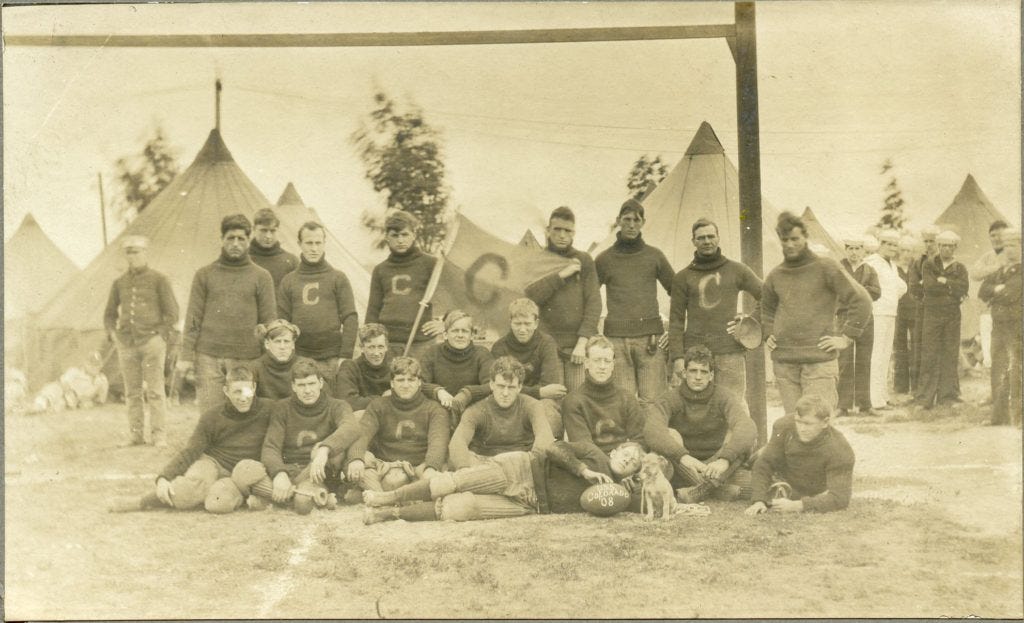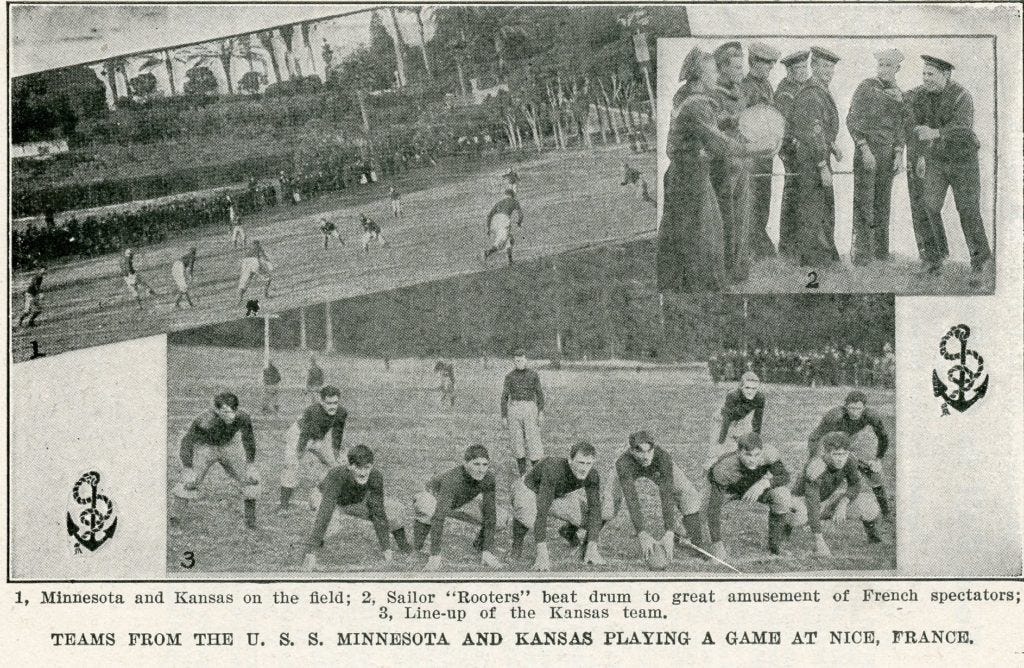American Football and the Great White Fleet
The Great White Fleet left Hampton Roads, Virginia, in December 1907, sailing the ocean blue and stopping in twenty ports on six continents over the next fourteen months. The journey was one part goodwill tour, a second part display of the Big Stick, and a test of America's naval technology. The sixteen participating battleships and support vessels collected at Hampton Roads, Virginia, in early December, allowing time for celebrations and castoff ceremonies that included a football tournament among the battleship crews.
Athletic contests between ships' crews in port were common in the U.S. Navy, including lifeboat races, boxing, baseball, and football games. The earliest football game involving a ship's crew appears to have been a March 1892 contest between the U.S.S. Charleston and San Francisco's Olympic Club, then the top football-playing athletic club on the West Coast. Like the athletic clubs, Navy cruisers and battleships had more young men in their crews than male students at most colleges and universities, and they dotted college football schedules on the coast until the late 1920s. Although policies regarding participation shifted at times, the team often included a mix of officers and enlisted men, including Marines, with former Naval Academy players numbering among the premier players on the fields.

The focus of naval football was the intra-service leagues organized at the port level, culminating in end-of-the-year tournaments among league champions for the East Coast or West Coast championship. (Hawaii hosted many naval football game as well.) Since the Great White Fleet included battleships usually stationed in the Pacific and all knew they would not see their home ports for some time, the gathering of ships made the football tournament 1907 special.
The tournament semifinals saw the U.S.S. Kansas wallop the U.S.S. Kentucky, and the U.S.S. Vermont beat the U.S.S. Alabama. The championship game, played on December 14, 1907, two days before the fleet sailed, occurred on a muddy field with water standing six inches deep in places. The 3,000 spectators saw little offense as the U.S.S. Kansas sunk the U.S.S. Vermont 4-2 on the strength of a field goal to win the 1907 naval pennant. (Field goals were still worth four points then.) It was the last football game most expected to see for some time.
Sailing south from Hampton Roads, the fleet's four divisions of four battleships and support vessels stopped at ports in the Caribbean, Central America, and the east side of South America before rounding the Straits of Magellan. (The Panama Canal did not open until 1914.) Sailing north, they stopped in Chile, Peru, Panama, and Mexico, before visiting San Francisco and Puget Sound. Each stop included welcoming celebrations, parades, and military balls, while the sailors took tours of local attractions while on leave.
Sailing west, the fleet called on Hawaii, New Zealand, and Australia before heading north to the Philippines and Japan. Reversing course, they headed south, sailing around the Indian subcontinent before entering the Suez Canal and the Mediterranean Sea. In the Mediterranean, part of the fleet made calls along the North African coast, some went to Sicily to assist in earthquake relief efforts, and other ships sailed to Nice and the French Riviera.
Among the ships sent to Nice was the U.S.S. Kansas, winners of the football tournament that preceded the Great White Fleet's tour. Perhaps learning of this accomplishment, the locals offered a silver cup and $6,000 in prize money to the winner of a football game between the U.S.S. Kansas and the U.S.S. Minnesota. It was the first American football game played in France, or Europe for that matter.
While we know little about the game itself, other than the U.S.S. Kansas winning 6-2, we know that one of the U.S.S. Kansas players was the former Annapolis fullback, William F. "Bull" Halsey, Jr. Halsey, of course, went on to command the South Pacific Area and the Third Fleet during WWII. He is one of only four to attain the rank of fleet admiral in U.S. Navy history.

The sailors of the Great White Fleet might have played pickup football games in other ports during the tour, but the game in Nice is the only documented instance of a formal football game played by the ships' crews.
Within a week or two of the game, the division left Nice, meeting the rest of the fleet near Gibraltar before crossing the Atlantic and returning its 14,000 sailors to Hampton Roads. From there, the various ships and sailors returned to their normal duty stations, and the Great White Fleet was no more.
Football Archaeology is reader-supported. Click here to buy one of my books or otherwise support the site.

